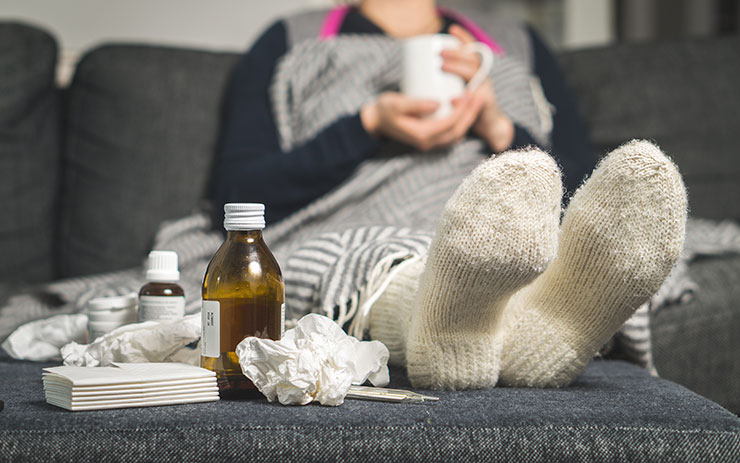Once again, the winter season has arrived! Along with the cold air and snow comes seemingly never-ending runny noses and coughs. Oftentimes, we reach for over-the-counter (OTC) cold medicines to help us get through the day without a thought. But before opening the medicine cabinet this year, let’s remember a few very important points.
Cough and cold medicines will not cure the illness, or even shorten the length of time you’re sick! These medicines will only help reduce symptoms for short periods of time. You will usually recover from the common cold in 7-10 days with time, rest, and drinking fluids. There are no medicines that will completely take a common cold away.
Read the label on each product. It includes important information such as ingredients, dosage directions, warnings, and proper storage. Read the label on each product you take. If taking more than one medicine, make sure none of the active ingredients are the same. Unpleasant side effects, or potentially serious symptoms of overdose, can occur if you take too much of the same active ingredient. If you are taking prescription medicines, pay careful attention to the drug interaction warnings on the label. Talk to your doctor or pharmacist if you have any questions.
Use products that treat only the symptoms you have. Do not take a medicine that treats runny nose, fever, congestion, and cough if you only have a cough. In this case, you should only take a cough medicine.
Only give the recommended dose and follow instructions on timing between doses. Taking more medicine than recommended, or taking a medicine more often will not help you feel better faster.
Always use the measuring device that comes with the medicine. Using household spoons or measuring devices from other products can lead to dosing errors. Read the markings on the measuring device carefully. If the medicine does not come with a measuring device, ask your pharmacist to help you choose one that will accurately measure the medicine dose you need. They may even have one they can give you.
Child-resistant caps are not “child-proof.” Given time, kids will get them open. If you see that a child has gotten into a medicine, even if you don’t think they ate or drank any, you should still call the poison center. It is best to check with the experts to ensure the child is not in any danger.
Children under the age of two should not take cough and cold medicines that contain decongestant and/or antihistamine. The Food and Drug Administration (FDA) recommends avoiding the use of these medications in young children because there is a risk for serious and potentially life threatening side effects.
Never use adult cold products for children. Children are not “small adults.” Use the medicine only if there is a dose available for your child’s age and weight on the label.
Do not refer to the medicine as candy to get a child to take it. This could confuse the child and lead to them taking the medicine on their own.
Always store cough and cold medicines out of sight and out of reach of young children, preferably in a locked cabinet. Between doses, it is easy and convenient to keep medicines out on the counter or dresser, but this is very dangerous because kids have open access to the medicine. Lock medicine away between doses.
Supervise tweens and teens when they are using cough and cold medicines. They want to be independent and take care of their symptoms, but they need guidance. Discuss all of the tips offered here. You can find more information about talking to your teens about medicine safety in the Scholastic OTC Medicine Safety program.
If a dosing error happens, or if a child eats or drinks a cold medicine, contact the Maryland Poison Center at 1-800-222-1222 right away for help. Do not wait for symptoms to appear. We are a free and confidential service here to help anytime, day or night.





Leave a Reply